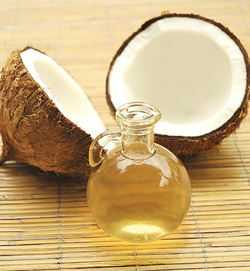
Today I will address some of those claims, and also share some facts about coconut oil in an attempt to clear up the confusion about this subject.
First, the hype. From the fact that a search for "coconut oil" pulls up 16 million hits on Google, you can tell that a lot of people are talking about this topic! From the Dr. Oz show, to the New York Times, coconut oil has been making headlines for a few years now. But how to separate the fact from the fiction?
- In a NYT article in 2011, one reporter explored the myths and facts surrounding coconut oil, including how it came to be demonized as an unhealthy substance. Part of the issue was that previous studies on coconut oil and health concerns used a partially hydrogenated version. As we have discussed before, hydrogenation (which creates trans fats, and destroys antioxidants and other good components) is one of the worst things that can possibly be done to an oil, and renders even healthy oils like coconut oil basically inedible. However, virgin coconut oil is a different sort of substance altogether, and, according to Dr. Brenna at Cornell University, "maybe it isn’t so bad for you after all." As always, how it's processed makes a huge difference!
- Dr. Oz' website claims health benefits such as reduced cholesterol, weight loss, improved thyroid function, blood sugar control, and more, can be attributed to coconut oil.
- In Dr. Mary Newport's 2013 book, Alzheimers Disease: What If There Was a Cure?, she discusses her husband's struggle with Alzheimer's, and their use of coconut oil to slow the progression of his disease, and improve his remaining years of life.
- I don't remember the source now, but have read in several different places how beef farmers used to feed coconut oil and coconut husks to cattle as a cheap and plentiful source of calories. The cattle were healthy, but not very fat....Until it was discovered that switching to feeding cows corn instead made them gain weight and fat much more quickly. (Hmmmm....wonder what it does to humans? And if you think you don't eat much corn, think again! See our previous post on the Empire of Corn.)
However, that being said, coconut oil is certainly not the evil substance it was once vilified as. And it does indeed have a number of properties which are likely quite healthy for us. Here are a few facts, to go along with the hype:
- If you've done much reading about coconut oil, you've probably heard that it is largely made up of saturated fat. However, most of it is a specific type of saturated fat called lauric acid. Lauric acid is a medium-chain fatty acid that is not found in animal fat. It also may be considered an essential fatty acid, as it is not made in the liver - only in the mammary gland - so basically it can only be obtained through the diet. There are only two dietary sources of lauric acid: mother's milk or butterfat (in small amounts), and coconut oil.
- This type of fatty acid has been shown to have antimicrobial, anti-fungal, anti-tumor, and immune-supporting properties. In Sally Fallon's excellent and exhaustively researched book, Nourishing Traditions, she mentions that in many tropical third-world countries, as the use of coconut oil has declined and the use of polyunsaturated vegetable oils has increased, the incidence of intestinal disorders and immune deficiency diseases has also increased.
- Vegans and those allergic or sensitive to dairy find coconut oil to be an excellent substitute for butter in cooking - especially in baked goods, where it lends a light, flaky/fluffy texture, and a mildly sweet and nutty flavor.
- Coconut oil has a higher smoke point than many other oils, and thus it is not as damaged during high-heat cooking, so it can be a better choice for frying and sauteing than most other oils out there.
- As we have previously explained at length, saturated fat isn't necessarily bad for you, and in fact has many health benefits. Extra virgin coconut oil can be a clean, tasty, natural, minimally processed, and highly useful source of healthy saturated fats - of course, in moderation.
Don't expect coconut oil to make you magically thin, or cure your every ailment, but if you're looking for a clean, healthy oil that tastes great for cooking, you really can't go wrong with coconut oil. And who knows - maybe it will make you a little healthier in the process? It certainly is a much better choice than highly processed (and highly toxic) hydrogenated vegetable oils.
To your health,
Rose.
P.S. Do you use coconut oil? What do you think of it? Share your experiences below!



 RSS Feed
RSS Feed